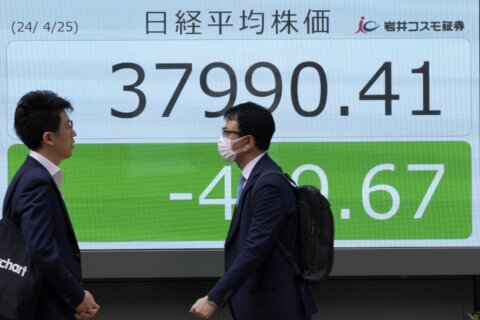SYDNEY (AP) — A lockdown in Australia’s largest city was extended through September and tougher measures to curb the coronavirus’s delta variant were imposed Friday, including a curfew and a mask mandate outdoors.
New South Wales state, which includes Sydney, reported 642 locally acquired infections in the latest 24-hour period, the fourth consecutive day of tallies exceeding 600.
Sydney has been locked down since late June after the more contagious delta variant was detected in a limousine driver who became infected while transporting a U.S. cargo aircrew from Sydney Airport.
Since then, 65 people have died from COVID-19 in New South Wales, included four overnight.
The Sydney lockdown was to end on Aug. 28, but the state government announced it will continue until Sept. 30.
The entire state has been in lockdown since last week because the virus had spread from the city.
A curfew will apply from 9 p.m. to 5 p.m. from Monday in the worst-affected Sydney suburbs. Wearing masks will be compulsory across the state outside homes. Previously, masks weren’t compulsory in all circumstances outdoors.
Elsewhere in the Asia-Pacific region:
— Malaysia expanded freedoms for those fully vaccinated Friday, allowing them to dine in at eateries and visit night markets despite record high daily infections. More businesses have been allowed to reopen as authorities this month begun to ease restrictions after nearly three months of lockdown. It’s widely viewed as a flip-flop in policies to tackle the pandemic. Daily infections in Malaysia hit 22,948 on Thursday, more than doubled since a lockdown began June 1. The country’s total infections have surged to nearly 1.5 million while 13,000 people have died. Caretaker leader Muhyiddin Yassin also said picnics, camping and non-contact sports are allowed for those fully vaccinated. He said the decision was made as over half of Malaysia’s adult population have been fully vaccinated. Some eateries reportedly voiced concern due to high daily virus cases. The Malaysian Medical Association also said authorities should focus on ramping up vaccination to cover at least 80% of the adult population.
— New Zealand’s first virus outbreak in six months has spread from the largest city of Auckland to the capital, Wellington. Health authorities said Friday that three people in Wellington who recently visited Auckland had tested positive. They said the outbreak had grown to 31 cases. The government also expanded the lockdown that had been put in place Tuesday after the first community case was found in Auckland. All of New Zealand will remain in lockdown until at least next Tuesday. Previously it had been a three-day lockdown for the nation and a seven-day lockdown only for certain areas. Genome testing has linked the outbreak to an infected traveler who returned from Sydney earlier this month and was quarantined, although health authorities don’t yet know how the virus escaped quarantine. New Zealand is continuing to pursue an elimination strategy aimed at wiping out the virus entirely.
— South Korea’s new infections exceeded 2,000 for the second straight day as officials extended the highest level of social distancing restrictions short of a lockdown in large population centers. Seoul, Busan, Daejeon and the southern resort island of Jeju will remain under the strongest social distancing rules for at least another two weeks. The rules prohibit private social gatherings of three or more people after 6 p.m. and force nightclubs and churches to close. Senior Health Ministry official Lee Ki-il said indoor dining hours at restaurants and cafes will be reduced by an hour to until 9 p.m. Some experts say officials should tighten social distancing even further, such as forcing more white-collar workers to work from home and expanding the gathering restrictions to daytime hours.
— Thailand passed 1 million total coronavirus infections Friday as its latest surge dropped below 20,000 daily cases for the first time in 10 days. Over 97% of the cases counted since the pandemic began have been since April. The new outbreak, connected to Bangkok entertainment venues and travel during the traditional new year in mid-April, grew more serious when the delta variant was detected in crowded construction worker camps and spread into markets, communities, and families. The government closed public places and imposed other restrictions last month, but infections and deaths remain high. On Friday, however, the Disease Control Department’s daily statistics report showed the average number of COVID-19 tests had fallen over the past seven days. Thailand reported 19,851 new cases on Friday. Apisamai Srirangsan, a deputy spokesperson for the government’s Center for COVID-19 Situation Administration, said in a briefing that although the number of daily cases remains high, it seems quite steady.
Copyright © 2024 The Associated Press. All rights reserved. This material may not be published, broadcast, written or redistributed.






